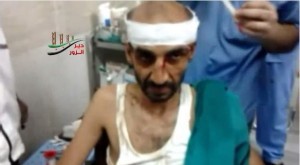One Day in a Field Hospital

Ward al-Assi
My friend, a doctor in the city of Deir El-Zor, called me today to tell me about something that had happened a few hours before.
It was one in the afternoon and the roads in the city were being continuously shelled by artillery. A driver brought an injured man covered in blood to the house now being used as a field hospital. There were two medics there – my friend, and a young woman who had turned to nursing because of the circumstances.

The doctor started by counting the wounds on the man’s body – and calculating how much surgical thread he had left – while the nurse and the driver started washing him.
When they wiped his face, they could see this was a young man in his late twenties. His eyes were swollen, his teeth broken and his chest covered in shrapnel wounds. The doctor did not know where to begin. There were 29 injuries in all – the man’s pelvis was severely damaged, as were his thighs, lower legs and feet.
He sustained these injuries when his house was hit by a shell.
Despite every attempt to save his life, the man died. He was not even 30.
His name was Meizar; he was born on August 29, 1983. His father’s name was Mohamed and his mother’s Najah.
The doctor discovered that the young man was in fact a neighbour of his. They had lived in the same area since childhood.
Meizar was born in the centre of Deir El-Zor. He went to school until seventh grade, when he left to work at his father’s bakery. He misbehaved badly, sometimes even violently, at school. Like all teenagers, he used to smoke out in the street with his friends, and sneak a glass of arak after his father went to bed.
In the months before he was killed, Meizar was a volunteer like so many young people in Deir El-Zor, delivering humanitarian aid and burying people killed in the conflict.
The field hospital where my friend works lacks almost every item that a basic clinic, let along a proper hospital, needs. Its only resources are painkillers, scalpels and medical alcohol.
In that respect, it is like the several other field hospitals that operate in most neighbourhoods of Deir El-Zor. They all carry on under the same conditions, with the same primitive medical equipment, staffed by some doctors and many young volunteers who lack the necessary experience.
No doctor has the training to save lives with such a dearth of equipment. My friend has been able to assist people with light injuries who did not need surgery. But 11 people have died at his field hospital. The nurse who helps him has not been trained to cope with death on this scale.
The dead are filed as “martyrs”, and their bodies filmed on mobile phones for the record.
I know both the doctor and the young man who died. We all lived in the same neighbourhood and went to the same school. My friend, a dark, slim man in his mid-thirties, studied medicine at the University of Damascus and has stayed on in Deir al-Zor for humanitarian reasons.
During our telephone conversation, he was crying. “Was it my fault?” he asked. “I was unable to help him.”
There is only so much one could do in a situation like this. We could all be like that man lying dead in a field hospital, and filmed on a mobile phone camera.
